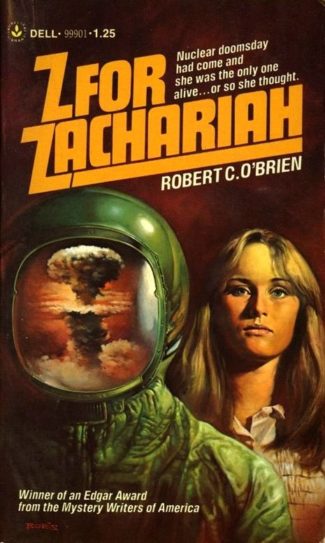 By ROBERT C. O’BRIEN (Dell; 1975)
By ROBERT C. O’BRIEN (Dell; 1975)
I know many of you read this ostensible young adult novel in your teens. I missed out on that experience (though I do recall cracking the same author’s MRS. FRISBY AND THE RATS OF NIHM as a kid), but having finally gotten around to doing so I can fully understand why Z FOR ZACHARIAH is so iconic. It’s a highly impacting tale that can be enjoyed by kids and grown-ups. In fact it probably works better as an adult novel, given the dark thrust of the narrative and unpleasant truths it reveals.
In fact it probably works better as an adult novel, given the dark thrust of the narrative and unpleasant truths it reveals.
Years after a nuclear war has left much of the USA a wasteland, 16-year-old Ann, who narrates in the form of diary entries, lives alone in a rural valley. Ann’s family left and never returned, and she’s learned to subside by herself. After a year of this, however, an intruder shows up.
The intruder is a man named Mr. Loomis, a scientist who’s developed a radiation-proof suit. Ann’s valley is secluded enough that the radiation suffusing much of the rest of the world hasn’t reached it. The nearby creek, though, is contaminated, and Mr. Loomis makes the mistake of swimming in it. He gets really sick, and the humanistic Ann, who’s been surreptitiously watching Mr. Loomis’s doings from a cave, is moved to help him.
As an exercise in dark and contained minimalism Z FOR ZACHARIAH (which won the Edgar Allen Poe Award) is nearly in a class by itself.
So begins an initially convivial relationship between Ann and Mr. Loomis that grows increasingly strained. The man gradually reveals himself as a selfish, controlling asshole, and eventually tries to rape Ann. She breaks free, and is forced to confront a far darker, scarier existence than the one she knew.
Ann’s rocky adaptation to Mr. Loomis’ mood swings, and her entire reality, are a large part of what makes this such a compulsive read. Ann’s life experience is so limited she has trouble fathoming how anyone can possibly be as rotten as Mr. Loomis turns out to be, but learns her lesson in the lethally suspenseful climax.
As an exercise in dark and contained minimalism Z FOR ZACHARIAH (which won the Edgar Allen Poe Award) is nearly in a class by itself. The prose is unerringly spare and intense, and while it’s unlikely a teenage girl could write diary entries as erudite as those of this novel, Ann’s quaintly naïve voice and worldview are quite convincing. Mr. Loomis is likewise an extremely well-rounded character, even if he does share some annoying traits common to genre novel bad guys, namely monotone speech patterns and the inability to conjugate his words.
There’s also the problem of the rushed and unsatisfying ending. That’s likely due to the fact that Robert O’Brien died before the novel was complete. The final passages were filled in by his widow and one of his daughters, who clearly did the best job they could. As for what Z FOR ZACHARIAH might have been had its talented author lived, we can only guess.
